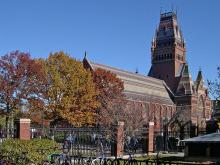Main Street

IN WALT DISNEY’S Tomorrowland, you still have to push the faucet to get water to wash your hands. I know this because I stood waving my soapy hands at the men’s room spigot for about 15 seconds, expecting water to magically appear, as it so often does these days. Finally the guy next to me said, “You have to push it.”
Still recovering from this irony, I left the men’s room and noticed, along the wall outside, a deserted bank of AT&T pay phones. The future, it turns out, just isn’t what it used to be, but then, at Disneyland, neither is the past.
It was a perfect blue, warm, sunny day in mid-April, Wednesday of Holy Week in fact, when I joined the cosmopolitan herd trekking from the Pinocchio parking lot to the gates of Disneyland—the original one, in California. But unlike the other middle-aged people there, I went unencumbered by children, and I didn’t pay $92 to enter the kingdom of Mickey. My trip was a corporate junket related to my higher-ed day job. I was responsible for three college students, but they had their per diem and didn’t need me, so I was free to wander, observe, and refuse to stand in those mile-long lines for the famous rides.
My first stop was on the faux turn-of-the-last-century Main Street, at “Market House.” It looks like an old-time general store, with wide-plank hardwood floors and rough lumber pillars. But closer inspection reveals a Starbucks in disguise: the same pastries, sandwiches, and drinks as at any Starbucks the world over. But the ultimate Disney touch was the small army of young Latina baristas behind the counter in floor-length, puffy-sleeved dresses straight out of Little House on the Prairie.
This analysis is not from Occupy Wall Street: It’s from those long-haired, hippie radicals over at Bloomberg News, whose Freedom of Information Act lawsuit finally pried the bailout details out of the unwilling Fed. Turns out the banks made $13 billion in profits off the government’s sweetheart-deal interest rates, which New Deal 2.0 is calling maybe “the biggest subprime loan operation of all time.”
The contrast couldn’t be clearer: While the government swung into extreme, double-secret action to save Wall Street, it’s sitting on its hands as long-term mass unemployment hammers Main Street.

There is something fundamentally wrong with our education system when the draws of a huge salary and big bonuses consistently trump the aspirations and dreams that were front and center in our lives just four years earlier. Debts, a lack of job opportunities in other fields, your basic standard-issue panic — or maybe a simple absence of imagination can take hold and send us running into the arms of the recruiter with the flashy suit, a Hollywood smile and promise of a better life.
As Terkel reminds us: “Young people will continue to go work in the financial sector as long as its pay is disproportionately higher than alternative careers. It's basic human nature: Follow the money.”
But what would it look like if we didn’t follow the money? What if Wall Street paid no more than schools or hospitals?
What would our economy look like if these leading young minds chose not to work for big banks and consultants, but instead were the teachers that helped turn failing schools around, the innovators and engineers who were designing products that would create thousands of new jobs?
What needs to be done so that the finest members of the 2012 graduating class head to Main Street instead of Wall Street?
Wall Street has been devastating Main Street for some time. And when the politicians -- most of them bought by Wall Street -- say nothing, it's called "responsible economics." But when somebody, anybody, complains about people suffering and that the political deck in official Washington has been stacked in favor of Wall Street, the accusation of class warfare quickly emerges. "Just who do these people think they are," they ask. The truth is that the people screaming about class warfare this week aren't really concerned about the warfare. They're just concerned that their class -- or the class that has bought and paid for their political careers -- continues to win the war.
So where is God in all of this? Is God into class warfare? No, of course not. God really does love us all, sinners and saints alike, rich and poor, mansion dwellers and ghetto dwellers. But the God of the Bible has a special concern for the poor and is openly suspicious of the rich. And if that is not clear in the Bible nothing is.
House Republicans announced a plan yesterday to cut $43 billion in domestic spend
By all journalistic reports, it was the Egyptian government of President Hosni Mubarak that sent thousands of armed thugs into Tahrir Square and the streets of Cairo yesterday to bring violence to w
Yesterday afternoon Sargent Shriver, a man of God and dedicated public servant, passed away at the age of 95.
You have to wonder -- when political ads focus on a college prank pulled by your opponent -- what else could that money have gone to?
Last week, I asked you all to tell FOX News that when it comes to truth and civility, they can do better. Thousands of you did. You aren't the only ones who see things getting worse than ever before. This week, a group of more than 130 former legislators, both Republicans and Democrats, released a letter urging for civility and encouraging candidates, once elected, to focus on cooperation to face our country's greatest challenges.